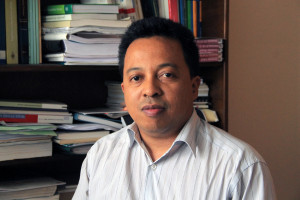Nicolas Razafindratsima, statistical engineer
Nicolas Razafindratsima works as a survey statistician in INED’s Survey Department

What trajectory led you to INED?
I’m from Madagascar and I first came to France for my higher education. After taking courses to prepare for admission to the grandes écoles in engineering (Maths Sup/Maths Spé), I joined ENSAI (Ecole de la Statistique et du Traitement de l’Information), where I trained as a statistical engineer. I then studied demography at IDUP (the Demographic Institute of the University of Paris I) and began a thesis in demographic economics at Sciences Po (the Paris Institute of Political Studies). My research focused on Madagascar, where I returned to do my fieldwork. It was there that I began working with INED, first as a correspondent for a research project that included that country. A researcher familiar with my experience encouraged me to apply to INED for a position as a statistician, and I was hired at the Institute in Paris in 2001. Meanwhile, I continued work on my thesis, which I finished four years later. My trajectory is somewhat atypical: I’ve got a PhD in demographic economics and I’m a statistical engineer. I would say I’m more of a statistician, though my point of view is rather different from that of a pure statistician.
What is your role at INED?
I work as a survey statistician in the Institute’s Survey Department, the largest of INED’s service departments. We produce survey data for researchers’ projects. I intervene at the outset of the survey process to study how to frame the statistical sample. Surveys are seldom conducted with the entire population under study, only a small part of it. To determine your sample, you first have to resolve the question of the sampling frame: is there a list of all the individuals the survey pertains to, and if so what can it tell us? You then determine the sample as a function of statistical criteria, feasibility, the specific research objectives, available financial resources, etc. The sampling frame may be made up of physical persons, but it may also be neighbourhoods or documents. In the End-of-Life survey, it was the list of deaths registered for the year. For the Dakar survey section of the MAFE project (Migrations Between Africa and Europe) we didn’t have a list of persons so the territory was divided up into neighbourhoods. The first thing the surveyors did was to get a list of the inhabitants of each dwelling in selected neighbourhoods. The persons identified during this first phase, the counting phase, were the survey respondents. I intervene again at the end of the survey process to ensure that the sample is representative of the population under study. I examine the “no-answers.” And I calculate how to weight so as to adjust the data. Sample defining and data adjustment are the two major statistical stages of survey data production. They ensure the applicability of the survey data to the entire population in question. The Survey Department also carries out methodological studies. This involves asking, for example, whether a respondent will answer differently if interviewed online than face-to-face. Or studying the “surveyor effect,” to determine whether the sex, origin, or some other characteristic of the surveyor might influence respondents’ answers, especially on sensitive subjects. This helps us measure margins of error and survey accuracy.
As you see it, what is specific about INED? What do you like most about working here?
I like the originality and diversity of the studies. A research project conducted at INED is, by definition, always innovative. It’s very stimulating. For example, in the 1990s in Paris, INED conducted the first French surveys on homeless people. The Survey Department played a pioneering role in conceiving the methodology, which was later adopted by INSEE at the national level. Above all, I appreciate the quality of exchanges at INED, a research institute of human proportions. It’s a wonderful opportunity to be able to collaborate with high-level technicians and researchers, experts in their fields. You yourself progress by working with them.
